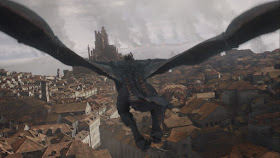“The Iron Throne” should have been a great series finale. It’s rife with callbacks to earlier parts of the series, and provides us with the satisfaction of seeing the Starks -- long the representatives of all that is just and fair in Westeros -- firmly in positions of power, settling the question of who will rule Westeros, and thus correcting the unconventional story turns of Ned’s beheading and the Red Wedding. However, most of what might be satisfying about these resolutions is thoroughly undermined by the path showrunners David Benioff and D.B. Weiss took to arrive at them.
Monday, May 20, 2019
Monday, May 13, 2019
Game of Thrones Season 8, Episode 5, “The Bells”
“Let it be fear.” These are Daenerys’s words to Jon after Jon can’t bring himself to return Daenerys’s affections early in the episode, and they are supposed to signal a sea change in her rule of Westeros: if she can’t win their love, then she’ll rule by fear. Much later in “The Bells,” Dany acts on this threat, using Drogon to raze King’s Landing and destroy much of the Red Keep, slaughtering Lannister soldier and innocent Westerosi civilians indiscriminately, despite the Lannister forces and the citizens of King’s Landing ringing the city’s bells midway through the battle to signal their surrender. Dany spares no one, and in doing so, has seemingly become the exact kind of terrible tyrant she always claimed to be fighting to eliminate from the world.
Monday, May 6, 2019
Game of Thrones Season 8, Episode 4, “The Last of the Starks”
After “The Long Night,” a lot of critics complained that the stakes of the battle seemed artificial, and the battle itself anti-climactic, partly because no major and/or beloved characters died. I disagreed, and instead found “The Long Night” quite stirring, but the first scene of “The Last of the Starks” made me question my contentment with the outcome of last week’s episode. Jon gives what is meant to be a powerful speech honoring those who died, but all I could think about was how much more powerful it would be if he were eulogizing Tyrion, Brienne, or Jaime, or if not them, then perhaps even more minor characters, like Sam, Gendry, or Tormund. Perhaps it might have been more powerful had Missandei been lighting Grey Worm’s pyre, or vice versa. As it is, however, I found the funeral scene underwhelming because we weren’t terribly attached to most of these characters.
Friday, May 3, 2019
Game of Thrones, Season 8, Episode 3, “The Long Night”
By taking place entirely in one location and focusing on one large-scale conflict, “The Long Night,” like season two’s “Blackwater” and season four’s “The Watchers on the Wall” before it, presents some interesting storytelling challenges: how do you pace what is essentially one long battle? How do you portray its many different dimensions – its epic scope, but also its quiet, intimate moments? How do you convey the mélange of emotions its characters experience – despair, terror, defiance, grief, rage, exhaustion, triumph – and make them all contribute to the overall arc of the episode (and without making the episode seem choppy or incoherent)? “The Long Night” presents a particular challenge in that it’s 82 minutes long, essentially the length of a short feature film. However, the episode turns this long runtime into an advantage, allowing different aspects of the battle room to breathe, and creating some absolutely stunning imagery and moments of high suspense in the process, all while resolving one of the series longest-running plotlines.



